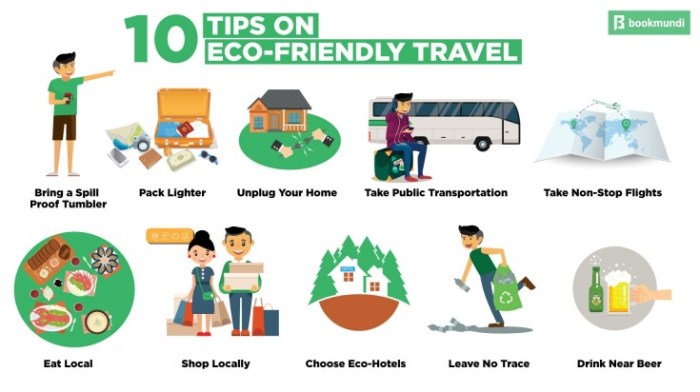Embark on a journey towards sustainable travel with our comprehensive guide to eco-friendly travel tips. Discover the profound impact your travel choices have on the environment and learn how to minimize your footprint while exploring the world.
From transportation and accommodation to activities and packing, we delve into every aspect of travel, providing practical tips and insights to help you make informed decisions that protect our planet and preserve its beauty for generations to come.
Introduction

Eco-friendly travel is a growing trend as people become more aware of the environmental impact of traditional travel practices. Flying, driving, and staying in hotels all contribute to greenhouse gas emissions, air and water pollution, and waste. Eco-friendly travel aims to minimize these impacts by choosing transportation methods, accommodations, and activities that are less harmful to the environment.
The benefits of eco-friendly travel extend beyond the environment. It can also save you money, help you connect with local cultures, and improve your overall health and well-being.
Transportation
Transportation is a major contributor to greenhouse gas emissions, accounting for about 24% of global emissions. Different modes of transportation have varying environmental impacts, and choosing eco-friendly options can significantly reduce your carbon footprint while traveling.
Air travel is the most carbon-intensive mode of transportation, followed by car travel. Public transportation, walking, and biking are all much more environmentally friendly options.
Choosing Eco-Friendly Transportation Options
- Consider taking a train or bus instead of flying. Trains and buses produce far less emissions than planes, and they can be a more comfortable and relaxing way to travel.
- If you must fly, choose a non-stop flight. Non-stop flights produce less emissions than flights with multiple stops.
- Pack light. The heavier your luggage, the more fuel your plane or car will use.
- Drive a fuel-efficient car. If you’re driving, choose a car with good gas mileage.
- Consider carpooling or taking public transportation. Carpooling and public transportation can help to reduce traffic congestion and emissions.
- Walk or bike whenever possible. Walking and biking are great ways to get exercise and reduce your carbon footprint.
The Benefits of Using Public Transportation, Walking, and Biking
- Reduced emissions: Public transportation, walking, and biking all produce far less emissions than driving.
- Improved air quality: By reducing emissions, public transportation, walking, and biking can help to improve air quality.
- Reduced traffic congestion: Public transportation, walking, and biking can help to reduce traffic congestion.
- Improved health: Walking and biking are both great ways to get exercise.
- Cost savings: Public transportation, walking, and biking can all be more cost-effective than driving.
The Role of Electric and Hybrid Vehicles in Eco-Friendly Travel
Electric and hybrid vehicles are becoming increasingly popular as eco-friendly transportation options. Electric vehicles produce zero emissions, while hybrid vehicles produce fewer emissions than gasoline-powered vehicles.
If you’re considering buying a new car, an electric or hybrid vehicle is a great option. Electric and hybrid vehicles can help you to reduce your carbon footprint and save money on gas.
Accommodation: Eco-friendly Travel Tips
Accommodation plays a significant role in the environmental impact of travel. Different types of accommodations have varying levels of environmental impact, and it’s important to consider this when making your travel decisions.
Eco-friendly accommodations are designed to minimize their environmental impact and promote sustainability. They typically use energy-efficient appliances, water-saving fixtures, and sustainable building materials. They also often offer amenities like recycling programs and organic food options.
Choosing Eco-Friendly Accommodations
- Look for accommodations that have been certified by a third-party organization, such as Green Key or LEED.
- Read reviews from other travelers to see what they have to say about the property’s sustainability practices.
- Ask the property directly about their environmental policies and practices.
Benefits of Eco-Lodges, Guesthouses, and Vacation Rentals
Eco-lodges, guesthouses, and vacation rentals often have a smaller environmental footprint than traditional hotels. They are typically located in natural settings and use sustainable building materials and practices.
Incorporating eco-friendly practices into your travels is not only beneficial for the environment but also aligns well with budget-conscious family vacations. Budget family vacations often involve seeking affordable accommodations, transportation, and activities, which often align with eco-friendly choices. By opting for energy-efficient accommodations, utilizing public transportation, and engaging in outdoor activities, families can minimize their environmental impact while creating lasting memories.
Eco-lodges often offer unique experiences, such as wildlife viewing and guided tours. Guesthouses provide a more intimate and home-like experience, while vacation rentals offer more space and privacy.
Importance of Energy Efficiency and Water Conservation
Energy efficiency and water conservation are important considerations when choosing an eco-friendly accommodation. Look for properties that use energy-efficient appliances, such as LED lighting and ENERGY STAR-rated appliances. Water-saving fixtures, such as low-flow toilets and showerheads, can also help to reduce your water consumption.
Activities
The activities you choose during your travels can have a significant impact on the environment. Consider the following factors when selecting activities:
• Carbon footprint: Choose activities that have a low carbon footprint, such as walking, cycling, or taking public transportation.
• Water consumption: Be mindful of water consumption, especially in water-scarce areas. Opt for activities that do not require excessive water usage.
• Waste generation: Choose activities that generate minimal waste, such as visiting museums or attending cultural events.
Supporting Local Businesses and Cultural Experiences
Supporting local businesses and cultural experiences not only benefits the local economy but also helps preserve traditional practices and customs. By engaging with local communities, you can learn about their culture, support their livelihoods, and contribute to the preservation of their heritage.
Respecting Wildlife and Natural Habitats
It is crucial to respect wildlife and natural habitats during your travels. Observe wildlife from a distance, avoid disturbing their natural behaviors, and never feed wild animals. Stay on designated trails when hiking or biking, and dispose of waste properly to minimize your impact on the environment.
Food and Drink
The food and beverage industry has a significant environmental impact, contributing to greenhouse gas emissions, water scarcity, and waste generation. Making eco-friendly choices about what we eat and drink can help reduce our impact on the planet.
Choosing Eco-Friendly Food and Drink Options
When choosing food and drinks, consider the following factors:
- Local and seasonal produce: Eating fruits and vegetables that are grown locally and in season reduces transportation emissions and supports local farmers.
- Organic and sustainably farmed: Organic and sustainably farmed products are grown without harmful pesticides and fertilizers, reducing environmental pollution.
- Plant-based foods: Meat and dairy production have a higher environmental impact than plant-based foods. Consider incorporating more plant-based meals into your diet.
- Fair trade and ethically sourced: Choose products that are fairly traded and ethically sourced to ensure that farmers and workers are treated fairly.
- Packaging: Opt for products with minimal or recyclable packaging to reduce waste.
Reducing Food Waste and Using Reusable Containers
Food waste is a major contributor to greenhouse gas emissions. To reduce food waste:
- Plan your meals: Plan your meals ahead of time to avoid buying and cooking more food than you need.
- Store food properly: Store food properly to extend its shelf life and prevent spoilage.
- Compost food scraps: Compost food scraps to create nutrient-rich soil for gardening.
Using reusable containers for food and drinks can also reduce waste. Consider bringing your own reusable water bottle, coffee mug, and food containers to avoid single-use plastics.
Packing

Packing for travel has a significant environmental impact. Single-use plastics, disposable items, and bulky packaging contribute to waste and pollution. By packing light and eco-friendly, we can minimize our impact on the planet.
Using reusable packing cubes and toiletries helps reduce waste. These durable containers can be used multiple times, eliminating the need for disposable bags and bottles. Opt for toiletries in bar form or refillable containers to further reduce plastic consumption.
Avoid Single-Use Plastics and Disposable Items
- Bring reusable water bottles, coffee cups, and cutlery to avoid single-use plastics.
- Pack snacks in reusable containers instead of disposable packaging.
- Use a reusable travel bag instead of plastic bags for packing.
Offsetting Your Carbon Footprint

Air travel is a significant contributor to greenhouse gas emissions. However, there are steps you can take to offset your travel emissions and minimize your impact on the environment.
Carbon offsetting involves investing in projects that reduce or remove carbon dioxide from the atmosphere, such as planting trees or investing in renewable energy. By calculating your travel emissions and purchasing carbon offsets, you can help neutralize the environmental impact of your trip.
Incorporating eco-friendly practices into your travels can enhance your experience while preserving the environment. Consider opting for luxury beach resorts that prioritize sustainability, offering eco-conscious amenities and responsible tourism initiatives. By embracing eco-friendly travel tips, you can minimize your environmental impact and contribute to the well-being of the destinations you visit.
Calculating Your Travel Emissions
There are several online calculators available to help you estimate the carbon footprint of your flights, such as the Carbon Footprint Calculator. Simply enter your travel details, including your departure and arrival cities, the class of travel, and the number of passengers, and the calculator will provide an estimate of your carbon emissions.
Purchasing Carbon Offsets
Once you have calculated your travel emissions, you can purchase carbon offsets from reputable organizations that support projects that reduce or remove carbon dioxide from the atmosphere. Look for organizations that are certified by recognized standards, such as the Gold Standard or the Verified Carbon Standard.
Types of Carbon Offset Projects, Eco-friendly travel tips
- Renewable energy: Projects that invest in renewable energy sources, such as solar and wind power, help reduce greenhouse gas emissions by replacing fossil fuels.
- Forestry: Projects that involve planting trees or protecting existing forests help absorb carbon dioxide from the atmosphere.
- Energy efficiency: Projects that promote energy efficiency measures, such as weatherizing homes and businesses, help reduce energy consumption and greenhouse gas emissions.
Supporting Reputable Carbon Offset Organizations
When choosing a carbon offset organization, it is important to research their reputation and track record. Look for organizations that are transparent about their projects and that provide detailed information about how your money will be used.
When traveling to a beach destination, it’s important to consider eco-friendly practices. To ensure your beach holiday is as sustainable as possible, consider using reusable items such as water bottles and shopping bags. Additionally, check out this beach holiday packing list for tips on packing light and reducing waste.
By making small changes, you can minimize your environmental impact while enjoying your beach vacation.
Conclusion
Traveling responsibly and sustainably is essential for preserving the environment and ensuring the well-being of local communities. By adopting eco-friendly travel practices, we can minimize our impact on the planet while creating a positive impact on the destinations we visit.
To become more sustainable travelers, it’s crucial to consider our choices throughout the entire journey. From transportation and accommodation to activities, food, and packing, every decision we make can contribute to a greener and more ethical travel experience. By making conscious choices and supporting businesses that prioritize sustainability, we can help protect the environment and ensure that future generations can enjoy the beauty of our planet for years to come.
Conclusion
As you embrace these eco-friendly travel practices, you not only reduce your environmental impact but also contribute to a more sustainable and responsible tourism industry. Let us all strive to be mindful travelers, leaving a positive legacy on the destinations we visit and inspiring others to do the same.
Answers to Common Questions
What are the benefits of eco-friendly travel?
Eco-friendly travel reduces your carbon footprint, supports local communities, preserves natural habitats, and promotes sustainable tourism practices.
How can I choose eco-friendly transportation options?
Opt for public transportation, walk, bike, or consider electric or hybrid vehicles when possible. Look for airlines that offer carbon offset programs.
What are some tips for packing eco-friendly?
Pack light, use reusable packing cubes and toiletries, avoid single-use plastics, and choose biodegradable or recycled materials.
How can I offset my carbon footprint while traveling?
Calculate your emissions using online calculators and invest in reputable carbon offset projects that support renewable energy, reforestation, or other environmental initiatives.